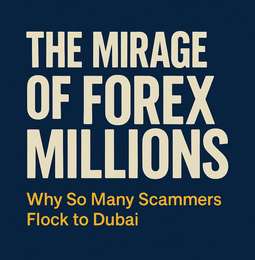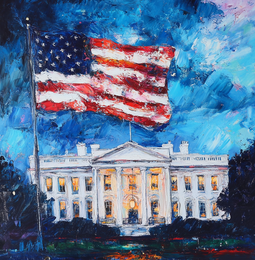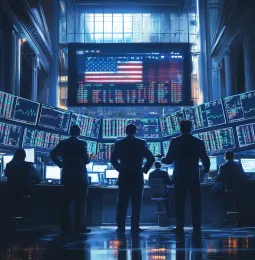"Stop Loss"
10.03.2024
1 min read
Iftekhar (Ifty) Khan
A stop-loss order is a common tool used in trading financial markets to manage risk. It is an instruction given to a broker to close the trade when it reaches a pre-determined price. When a stop-loss order is triggered, it helps an investor to limit their loss on a position by automatically closing out their position when the market moves against them.
"Emotions"
10.03.2024
1 min read
Iftekhar (Ifty) Khan
Trading in financial markets can be an emotional roller coaster ride, with traders often experiencing intense feelings of greed, fear, excitement, and anxiety. It's not uncommon for traders to get carried away by their emotions and let them cloud their judgment, leading to poor decision-making and unnecessary risk-taking.
"Choosing the right broker"
10.03.2024
1 min read
Iftekhar (Ifty) Khan
When it comes to selecting a suitable trading broker, it's crucial to consider multiple factors to make informed decisions and avoid costly mistakes.
"Learn how to accept losses in trading"
10.03.2024
1 min read
Iftekhar (Ifty) Khan
Trading in financial markets can be a challenging endeavour, especially when you experience a string of losses. However, it's important to remember that losses are a natural part of trading, and they don't have to derail your trading plan.
"The Current Stability of BTCUSD and Its Impact on Financial Markets"
10.03.2024
2 min read
Iftekhar (Ifty) Khan
The emergence of Bitcoin (BTC) as a global digital currency has disrupted traditional financial systems, challenging the notion of stability within the realm of finance. BTCUSD, the pairing of Bitcoin with the US dollar, has gained significant attention due to its potential implications on the stability of financial markets. This essay examines the current stability of BTCUSD and explores its potential impact on the broader financial landscape
"Non Farm Payroll"
10.03.2024
1 min read
Iftekhar (Ifty) Khan
Nonfarm payroll refers to the measure of the number of workers in the United States except those in farming, private households, proprietors, non-profit employees, and active military. The nonfarm payroll report is a monthly report published by the U.S. Bureau of Labour Statistics that provides an estimate of the number of jobs added or lost in the previous month, as well as the unemployment rate.
"Stop Loss"
10.03.2024
1 min read
Iftekhar (Ifty) Khan
A stop-loss order is a common tool used in trading financial markets to manage risk. It is an instruction given to a broker to close the trade when it reaches a pre-determined price. When a stop-loss order is triggered, it helps an investor to limit their loss on a position by automatically closing out their position when the market moves against them.
"Emotions"
10.03.2024
1 min read
Iftekhar (Ifty) Khan
Trading in financial markets can be an emotional roller coaster ride, with traders often experiencing intense feelings of greed, fear, excitement, and anxiety. It's not uncommon for traders to get carried away by their emotions and let them cloud their judgment, leading to poor decision-making and unnecessary risk-taking.
"Choosing the right broker"
10.03.2024
1 min read
Iftekhar (Ifty) Khan
When it comes to selecting a suitable trading broker, it's crucial to consider multiple factors to make informed decisions and avoid costly mistakes.
"Learn how to accept losses in trading"
10.03.2024
1 min read
Iftekhar (Ifty) Khan
Trading in financial markets can be a challenging endeavour, especially when you experience a string of losses. However, it's important to remember that losses are a natural part of trading, and they don't have to derail your trading plan.
"The Current Stability of BTCUSD and Its Impact on Financial Markets"
10.03.2024
2 min read
Iftekhar (Ifty) Khan
The emergence of Bitcoin (BTC) as a global digital currency has disrupted traditional financial systems, challenging the notion of stability within the realm of finance. BTCUSD, the pairing of Bitcoin with the US dollar, has gained significant attention due to its potential implications on the stability of financial markets. This essay examines the current stability of BTCUSD and explores its potential impact on the broader financial landscape
"Non Farm Payroll"
10.03.2024
1 min read
Iftekhar (Ifty) Khan
Nonfarm payroll refers to the measure of the number of workers in the United States except those in farming, private households, proprietors, non-profit employees, and active military. The nonfarm payroll report is a monthly report published by the U.S. Bureau of Labour Statistics that provides an estimate of the number of jobs added or lost in the previous month, as well as the unemployment rate.
"Stop Loss"
10.03.2024
1 min read
Iftekhar (Ifty) Khan
A stop-loss order is a common tool used in trading financial markets to manage risk. It is an instruction given to a broker to close the trade when it reaches a pre-determined price. When a stop-loss order is triggered, it helps an investor to limit their loss on a position by automatically closing out their position when the market moves against them.
"Emotions"
10.03.2024
1 min read
Iftekhar (Ifty) Khan
Trading in financial markets can be an emotional roller coaster ride, with traders often experiencing intense feelings of greed, fear, excitement, and anxiety. It's not uncommon for traders to get carried away by their emotions and let them cloud their judgment, leading to poor decision-making and unnecessary risk-taking.
"Choosing the right broker"
10.03.2024
1 min read
Iftekhar (Ifty) Khan
When it comes to selecting a suitable trading broker, it's crucial to consider multiple factors to make informed decisions and avoid costly mistakes.
"Learn how to accept losses in trading"
10.03.2024
1 min read
Iftekhar (Ifty) Khan
Trading in financial markets can be a challenging endeavour, especially when you experience a string of losses. However, it's important to remember that losses are a natural part of trading, and they don't have to derail your trading plan.
"The Current Stability of BTCUSD and Its Impact on Financial Markets"
10.03.2024
2 min read
Iftekhar (Ifty) Khan
The emergence of Bitcoin (BTC) as a global digital currency has disrupted traditional financial systems, challenging the notion of stability within the realm of finance. BTCUSD, the pairing of Bitcoin with the US dollar, has gained significant attention due to its potential implications on the stability of financial markets. This essay examines the current stability of BTCUSD and explores its potential impact on the broader financial landscape
"Non Farm Payroll"
10.03.2024
1 min read
Iftekhar (Ifty) Khan
Nonfarm payroll refers to the measure of the number of workers in the United States except those in farming, private households, proprietors, non-profit employees, and active military. The nonfarm payroll report is a monthly report published by the U.S. Bureau of Labour Statistics that provides an estimate of the number of jobs added or lost in the previous month, as well as the unemployment rate.

The Mirage of Forex Millions: Why So Many Scammers Flock to Dubai
07.04.2025
3 min read
Iftekhar (Ifty) Khan
Intro: Pulling Back the Curtain on the Instagram Illusion
Dubai: land of supercars, sky-high living, and sunsets so photogenic they practically have their own influencer agency. But beneath the sparkle and sand lies a different kind of gold rush - one led by so-called forex gurus, Instagram trading influencers, and "mentors" who promise you financial freedom... if you just DM them now.

Is There a Way to Trade Stock Options Using a Fibonacci Strategy?
24.03.2025
2 min read
Jeff Sonnier
Trading stock options can feel like navigating a jungle—thrilling, but full of hidden traps. Many traders seek structure in the chaos, and Fibonacci retracements and extensions offer exactly that: a logical, time-tested approach to identifying potential turning points in the market. But can Fibonacci levels actually be used to trade stock options effectively? Let’s explore how this strategy works and whether it’s the missing piece in your trading arsenal.

Gold, Copper, and Crypto: Pakistan's Resource Renaissance and Its Market Implications
24.03.2025
2 min read
Iftekhar (Ifty) Khan
As market analysts and experienced traders, we’ve learned to read between the lines of geopolitical news and resource discoveries. When a country like Pakistan suddenly finds itself sitting on billions in mineral wealth and flirts with cryptocurrency reform, smart traders start paying attention.
Let’s unpack what’s really happening in Pakistan and how it could impact the financial markets.

Deep Seek: The AI That Shook the Markets
30.01.2025
2 min read
Iftekhar (Ifty) Khan
Deep Seek: The AI That Shook the Markets and What Traders Can Learn From It
Today will likely go down as one of those “where were you when…” days for traders. Financial markets were rocked by a massive sell-off, with tech stocks leading the charge downward. The instigator? Deep Seek.
No, it’s not a disaster movie villain or a spy operation—it’s an advanced AI system from China that just took the tech world (and the financial markets) by storm. The story of Deep Seek and its R1 model is more than a tale of innovation; it’s a wake-up call for traders about the power—and risks—of AI in the modern financial landscape.

From Oval Office to Opportunity: How Trump’s Inauguration Could Shape the US Markets
30.01.2025
2 min read
Louise Carr
Every few years, a political event comes along that promises to shake the financial markets to their core. Love him or loathe him, Donald Trump’s inauguration would undoubtedly be one such event. Known for his brash style, unpredictable policy tweets, and market-moving decisions, Trump’s potential return to the White House could create significant ripples across the US financial landscape. But the question remains: who stands to win, and who could lose?

FinTok Frenzy: Are TikTok Financial Hacks a Treasure or a Trap?
16.01.2025
20 min read
Iftekhar (Ifty) Khan
The rise of TikTok has been nothing short of meteoric, reshaping how we consume entertainment, learn new skills, and, surprisingly, manage our money. With hashtags like #FinTok and #InvestingTips amassing billions of views, a new breed of financial influencers has emerged, promising everything from "guaranteed" stock picks to the secrets of overnight wealth. But for traders and aspiring investors, the question remains: Is FinTok a treasure trove of insights or a minefield of misinformation?

The Realities of Trading the Financial Markets
28.12.2024
2 min read
Louise Carr
When it comes to trading the financial markets, the promises often sound too good to be true. Who wouldn’t want to work from a beach with a laptop, pulling in profits while sipping a mojito? But let’s get real for a moment: trading is as much about grit as it is about glamour. At CLiK Trading Education, we’re all about shedding light on the realities of trading, balancing the thrill of market opportunities with the importance of preparation and education.

Why Brokers Using the Same Trading Platforms Offer Different Experiences
20.12.2024
2 min read
Iftekhar (Ifty) Khan
When traders select a broker, they often assume that the trading platform—whether it’s cTrader, MetaTrader 4 (MT4), or MetaTrader 5 (MT5)—is the key factor dictating their trading experience. However, while the platform plays an important role, significant variations exist between brokers using the same software. These differences stem from factors such as execution speeds, instrument offerings, and infrastructure setups. Let’s dive into why these disparities occur.

Options: The Protective Put (Hedging)
25.11.2024
1 min read
Jeff Sonnier
The Protective Put is a popular risk management strategy used by investors to limit potential losses in a stock while retaining its upside potential. Think of it as buying insurance for your stock. Here's a deeper dive into how it works:

Trump’s Presidential Comeback: What This Means for Financial Markets and Traders
25.11.2024
3 min read
Iftekhar (Ifty) Khan
The financial world has just experienced a major shake-up: Donald J. Trump is back in the White House. While reactions are as polarized as ever, the markets have made one thing clear – the Trump effect is already in full swing. From surging dollar indices to record-breaking Bitcoin prices, the initial responses signal a wave of change. But how deep does this go, and what does it mean for traders looking to navigate this uncertain yet opportunity-filled environment?
